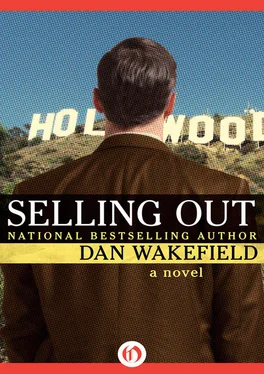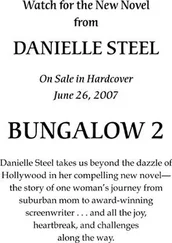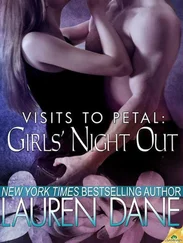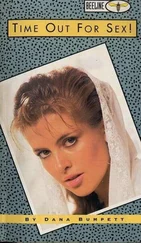“Thanks,” Ned said when they parted, “this was civilized.”
Perry paced the apartment and drank pots of black coffee, waiting to hear from Mona about the reaction from the network. A week passed. He was tempted to put a little brandy in his coffee, but he kept himself dry during the day, in shape, ready for the word to come down, ready to be told to “go for it.”
When Mona finally called, it was not to give him the go sign, but to tell him the network wanted to have a meeting about the project.
Perry immediately stiffened.
“Didn’t Judd Wizener like it?”
“Perry, he adored it.”
“So why do we have to meet with him? Does he want to talk casting already?”
“Dear, we aren’t meeting with Judd.”
“Why not? I thought he adored the project.”
“He’s not with the network any longer, dear. Evidently, this treatment of yours is the last thing he read.”
“My God! What happened to him?”
“He’s gone into independent production.”
Perry sat down.
“I thought he was strong. I thought he was entrenched.”
“Things happen,” said Mona.
“So who are we seeing? Who’s in charge?”
“JoyAnn Wales.”
“Who’s she? ”
“A brilliant young woman, I understand. Came to the network three years ago from Boeing.”
“From Boeing Aircraft? What is she, a test pilot?”
“An engineer. Absolutely brilliant, I’m told.”
“What the hell do engineers know about stories?”
“Now Perry. We mustn’t be defensive before we’ve even taken our meeting.”
“Well what did she say about it? Did she like the treatment? Did she get the point?”
“I’m sure she adored it. All I really know is that she has some notes.”
“Holy God.”
Some notes.
Some suggestions, no doubt, on how to improve his fragile story from a hotshot young woman aerospace engineer.
When he hung up, Perry poured a tumbler of wine.
JoyAnn Wales was a small, physically delicate young woman with a voice like sandpaper. Her blond hair was worn in a feathery bob, and her dress, a gossamer sort of thing that added to the impression that she might be blown away by the first breeze through the palm trees, was a wash of soft pastels. But her voice anchored her. Her voice was in a constant state of irritation, as if inflamed.
“When is this thing supposed to take place?” she asked harshly.
“Right now,” said Perry.
“We see it as universal,” cooed Mona, “but in a contemporary scene and setting.”
JoyAnn picked up the script and started flipping through it, slapping back the pages as if they were bad children.
“They sound like they’re wearing hoopskirts,” she said.
Perry could feel his pulse picking up.
“What gives you that idea?” he asked.
“This daughter—for Christ’s sake, she leaves her job, forgets her career, dumps her man, to go play nursemaid to this grungy old fart?”
“That’s her father,” Mona pointed out.
“Is that supposed to explain why she’s such a wimp?” JoyAnn demanded.
“She’s supposed to be a decent person,” Perry said. “Evidently you find that hard to identify with.”
“What Perry means,” Mona said, “is that we’re trying to portray a young woman whose loyalty to her father makes her sacrifice some of her own desires of the moment.”
“If she wants to make it with him, we might have a story here. The last incest piece we did got a forty-three share.”
“Perhaps Perry and I can think this through again, with your notes in mind,” Mona said.
JoyAnn stood up.
“The bottom line is,” she said, “I just don’t know where these people are coming from.”
She tossed the treatment back to Perry. It fell to the floor in front of him. He did not pick it up. He got to his feet, feeling at the same time a fierce anger and a wild sense of freedom.
His heart was beating wildly, even though he had not only taken his beta blocker before the meeting, he had also popped a Valium he’d borrowed from Ronnie just for good measure. He felt that his pounding heart was a good sign, a sign he was still alive, still human. He considered his pounding heart to be a triumph of nature over chemistry, even over Hollywood.
“I can tell you where I am coming from,” he said to JoyAnn Wales. “I am coming from Vermont. And I am finally going back. Now. In the nick of time.”
JoyAnn looked puzzled, and turned to Mona.
“I’m afraid he doesn’t get the picture,” the sharp young executive said.
“Oh, I’m afraid he does,” said Mona, standing up herself now.
Perry placed his hands on JoyAnn’s desk, leaned toward her, and said, with pleasure and fervor, a single word:
“ Ciao .”
Outside the building, he hugged Mona.
“You can have what I wrote,” he said. “Free of charge. Maybe you can make something of it, somewhere else. Or here. Wherever. Let me know if I can do anything.”
Mona smiled.
“Don’t worry,” she said. “Give my love to Vermont. And to Jane.”
He turned and started for his car and Mona called after him.
“Perry?”
“Yes?”
“God speed.”
He had never heard anyone say that before.
“Thank you,” he said.
Perry called American Airlines and booked a tourist-class seat on the next available flight to Boston.
“Do you wish to make a return reservation?” the ticket person asked.
“No. This is one-way,” he said. “No return.”
When he spoke the words he suddenly felt as if lead weights were lifted off him. He felt he could fly to Boston without even getting on the plane, just by walking out the door and taking the first step East.
Despite this new feeling of freedom, Perry did not yet have the courage to call Jane. It took all the chutzpah he could muster to call Al Cohen and ask if he could stay with him and Rachel for at least a night; on the floor, anywhere.
Perry felt guilty that Al wasn’t even angry. In fact, Al wasn’t even surprised, but he seemed very pleased.
The Cohens’ living room looked to Perry like a longed-for safe harbor.
First he cried.
Then he launched into breast-beating tirades against his own phony behavior, his betrayal of their friendship. This eloquent self-flagellation was stifled only by Rachel’s sticking a beer and a sandwich into his hands. Once Perry’s mouth was full, Al shut him up with what he said was the final word on the subject, courtesy of Robert Frost:
“Home is the place where, when you have to go there,
They have to take you in.”
“Home is also the place,” said Rachel, “where you have to listen to all the Robert Frost that is quoted without complaining to the management.”
Perry winced, remembering that night an eon or so ago before he went West, when after a wonderful dinner and too much brandy he yelled at Al for quoting something of Frost, bitching that the poet and his observations were out of fashion, or some such arrogant nonsense. It sounded to him now like something the Vees would have said.
“Will you forgive me?” he asked. “You have every reason to turn me out in the cold.”
“But to quote Mr. Frost yet again,” said Rachel, reaching out and giving Perry a tweak on the nose, “home is ‘something you somehow haven’t to deserve.’”
“I love it,” Perry laughed. “The quote, and being here.”
He spent the first night on the Cohens’ couch. The next morning he had coffee and juice and bacon and eggs and toast and then he walked alone to the woods that bordered the house where he once had lived.
In the woods he inhaled the smells of spring. He sank to his knees. There was a crocus just beginning to bud and he leaned to it, touched it, and knew, in a surge of comprehension that was almost like a blow: this is the gold .
Читать дальше












